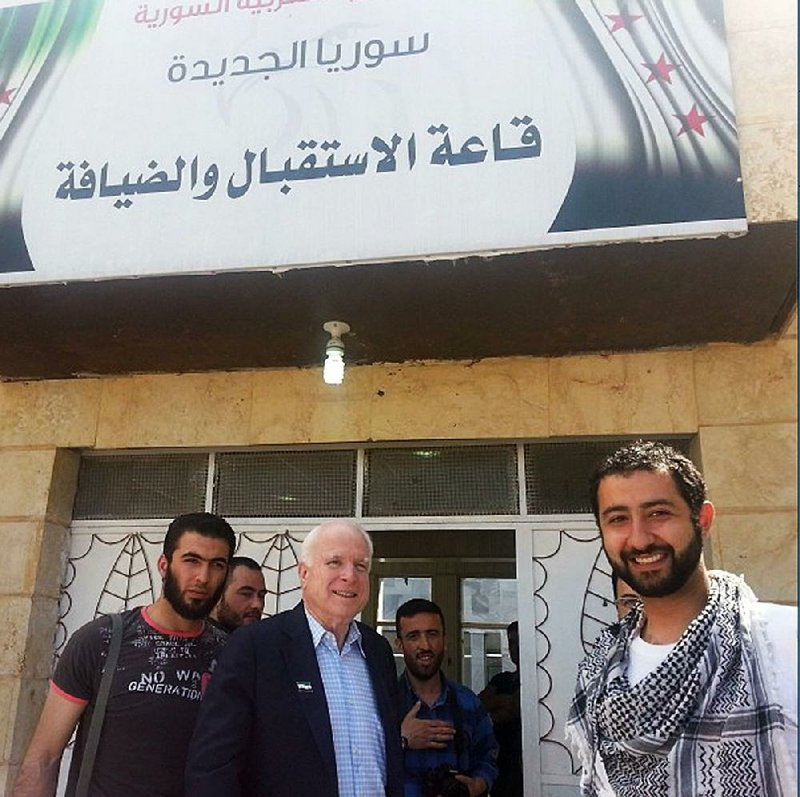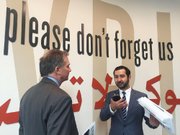WASHINGTON -- While the Syrian government drops bombs and fires bullets in rebel-held areas, an activist with extensive Arkansas ties delivers financial aid and messages of encouragement to the war-plagued country.
When he returns to the United States, he shares his observations with lawmakers and with officials at the U.S. Holocaust Memorial Museum's Center for the Prevention of Genocide. The center is in Washington, D.C.
Mouaz Moustafa, the executive director of the Syrian Emergency Task Force, said he's made numerous trips to the region -- "too many to count" -- since the civil war began in 2011.
He completed his latest journey to the Syrian-Turkish border earlier this month, delivering supplies and returning with fresh accounts of the turmoil there.
"It was very powerful. At the same time, it was very heartbreaking to see the suffering that is happening," he said in an interview.
While there, the 33-year-old activist met with evacuees, medical workers, humanitarian officials and victims of the regime of Bashar Assad, the Syrian president.
Moustafa was joined by Natalie Larrison, the task force's Arkansas-based director of outreach.
"We drove actually up to the border. I got to see the country that we've been working to help with my own eyes -- over the wall," she said.
They passed along $8,000 -- money to run the task force's Wisdom House school and Tomorrow's Dawn women's center.
They also delivered school supplies, 50 cloth dolls and a heap of handwritten notes of sympathy and solidarity.
Students from central Arkansas and Fayetteville wrote many of the "letters of hope"; others were mailed to the task force's Hillcrest post office box.
"I think the Syrian government has used hopelessness as a weapon," Larrison said. "This is our counter campaign to show the Syrian people that they have not been forgotten, that they are loved and that they are not alone in their suffering."
Moustafa, who immigrated from Syria to the United States when he was 12, was born in Damascus but attended junior high in Fort Smith, high school in Hot Springs and college in Walnut Ridge and Conway.
In 2008, after graduating from the University of Central Arkansas, he headed to Washington, interning with then-U.S. Rep. Vic Snyder and then joining the staff of then-U.S. Sen. Blanche Lincoln.
Before the outbreak of war, he also worked for the Democratic National Committee, Al-Jazeera news network and groups opposing authoritarian regimes in Libya and Egypt.
But he shifted his focus to his native land after civil unrest broke out there.
Since then, his efforts have been noticed. He has traveled with lawmakers to the region and appears on cable news programs. Last month, he was quoted in The New York Times.
A decade after moving to the U.S. capital, Moustafa still has a telephone with a 501 area code. And he's maintained his Arkansas connections over the years. The task force has offices in Little Rock as well as Washington.
Moustafa continues to develop ties in the nation's capital.
After a Syrian government photographer defected, escaping with tens of thousands of war-related pictures, Moustafa arranged for the man, code-named Caesar, to meet with holocaust museum officials.
The images horrified those who saw them; a number of the photos are now on display at the museum.
Cameron Hudson, the genocide prevention center's director, said it's important to focus attention on the Syrian people's suffering.
The organization wants to make sure that "Americans understand what's happening in Syria right now. It's essentially a crime against humanity," he said.
The devastation is enormous.
"There's more than half a million people who've been killed and more than half the country -- more than 11 million people -- have been displaced from their home. We look at it as the largest humanitarian crisis since World War II," Hudson said.
Thanks to modern technology, it's impossible to conceal atrocities of this scale, Hudson said.
"We know within minutes of when these crimes are committed," he said.
"[In] Yugoslavia, we found out about the mass killings that were going on weeks and months after they happened. Here we're seeing these mass killings go on right in front of our very eyes," he said. "I think the shocking part is that we are still so powerless to stop it."
Moustafa said he reached out to the museum after trying and failing to get U.S. officials to take firm action.
"I was disillusioned, to be honest, with the administration, with governments, and wanted a place that I felt could archive, memorialize what has happened in Syria," he said. "Since then, we have become partners with the Holocaust Museum in our work on Syria. ... The Holocaust Museum is an amazing institution and ally."
Moustafa is an effective advocate for the people of Syria, Hudson said.
"I think he is really the best example of an American and a Syrian that we could point to in terms of trying to create understanding and build bridges," Hudson said.
The naturalized U.S. citizen is also a goodwill ambassador for the Natural State, according to Hudson.
"He's very, very proud of his home state of Arkansas; he's very proud to be connected to the people of Arkansas and to connect those people in Syria," he said.
Shortly before his latest trip to Syria, Moustafa toured the Syrian photographer's exhibit with U.S. Rep. French Hill, a Republican from Little Rock.
The lawmaker walked beside Moustafa, viewing the images and pausing to write one of the notes that Moustafa ultimately delivered.
The photos on display included Syrians with their eyes gouged out and others who looked like famine victims.
"We shared the most palatable pictures, believe it or not. The ones that are the least graphic," Moustafa said.
Hill, who has voted to impose tougher sanctions on Assad and his allies, expressed admiration for Moustafa's work.
"I'm so grateful that we have an Arkansan at the forefront of convincing not just the United States but all countries of the world to reject Assad's genocide and destruction of his own country," Hill said.
Turning to Moustafa, Hill told him: "You make our state proud."
SundayMonday on 05/14/2018


